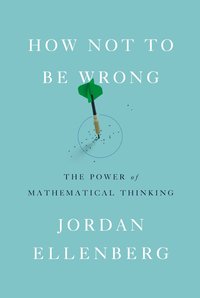

Purchase
The Power of Mathematical Thinking
Penguin Press
June 2014
On Sale: June 3, 2014
480 pages
ISBN: 1594205221
EAN: 9781594205224
Kindle: B00G3L6JQ4
Hardcover / e-Book
Add to Wish List
Non-Fiction
The Freakonomics of math—a math-world
superstar unveils the hidden beauty and logic of the world
and puts its power in our hands The math we learn in school can seem like a dull set of
rules, laid down by the ancients and not to be questioned.
In How Not to Be Wrong, Jordan Ellenberg shows us how
terribly limiting this view is: Math isn't confined to
abstract incidents that never occur in real life, but rather
touches everything we do—the whole world is shot
through with it. Math allows us to see the hidden structures underneath the
messy and chaotic surface of our world. It's a science of
not being wrong, hammered out by centuries of hard work and
argument. Armed with the tools of mathematics, we can see
through to the true meaning of information we take for
granted: How early should you get to the airport? What does
"public opinion" really represent? Why do tall parents have
shorter children? Who really won Florida in 2000? And how
likely are you, really, to develop cancer? How Not to Be Wrong presents the surprising
revelations behind all of these questions and many more,
using the mathematician's method of analyzing life and
exposing the hard-won insights of the academic community to
the layman—minus the jargon. Ellenberg chases
mathematical threads through a vast range of time and space,
from the everyday to the cosmic, encountering, among other
things, baseball, Reaganomics, daring lottery schemes,
Voltaire, the replicability crisis in psychology, Italian
Renaissance painting, artificial languages, the development
of non-Euclidean geometry, the coming obesity apocalypse,
Antonin Scalia's views on crime and punishment, the
psychology of slime molds, what Facebook can and can't
figure out about you, and the existence of God. Ellenberg pulls from history as well as from the latest
theoretical developments to provide those not trained in
math with the knowledge they need. Math, as Ellenberg says,
is "an atomic-powered prosthesis that you attach to your
common sense, vastly multiplying its reach and strength."
With the tools of mathematics in hand, you can understand
the world in a deeper, more meaningful way. How Not to Be
Wrong will show you how.
Comments
No comments posted.
Registered users may leave comments.
Log in or register now!
| 


 © 2003-2025 off-the-edge.net
all rights reserved Privacy Policy
© 2003-2025 off-the-edge.net
all rights reserved Privacy Policy